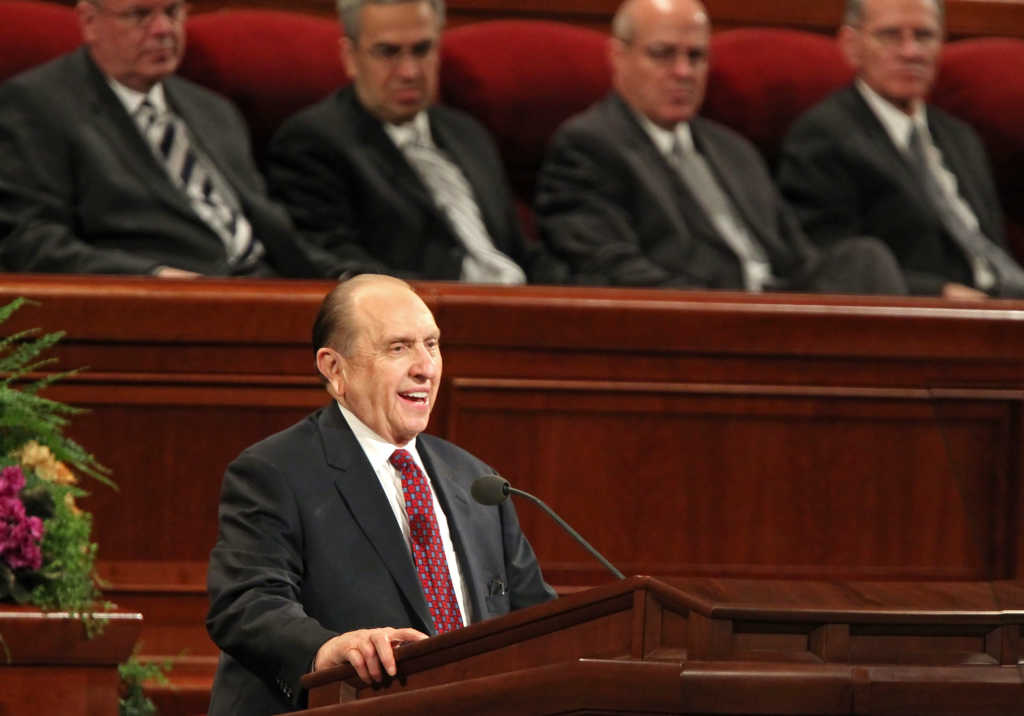Thomas S. Monson, president of the Church of Jesus Christ of Latter-day Saints since 2008, died on Tuesday at his Salt Lake City home at the age of 90. On Wednesday, the New York Times ran an obituary for Monson that proved just how little respect the paper had for the religious leader and his ministry.
As the Daily Wire reported, the Times chose any interesting news peg for the article and its social media promotion. The paper issued the following tweet Wednesday morning:
Thomas Monson, the president of the Mormon church who rebuffed demands to ordain women as priests and refused to alter church opposition to same-sex marriage, died Tuesday at 90 https://t.co/NKEHpAXzb1
— The New York Times (@nytimes) January 3, 2018
The focus on same-sex marriage and perceived lack of female representation in the Mormon church carried over to the beginning paragraphs of the obit, which read:
Thomas S. Monson, who as president of the Church of Jesus Christ of Latter-day Saints since 2008 enlarged the ranks of female missionaries, but rebuffed demands to ordain women as priests and refused to alter church opposition to same-sex marriage, died on Tuesday at his home in Salt Lake City. He was 90.
His death was announced on the church’s website.
Facing vociferous demands to recognize same-sex marriage, and weathering demonstrations at church headquarters by Mormon women pleading for the right to be ordained as priests, Mr. Monson did not bend. Teachings holding homosexuality to be immoral, bans on sexual intercourse outside male-female marriages, and an all-male priesthood would remain unaltered.
While no one would argue should factoids belong in the obituary of a public figure and religious leader like Monson, many have questioned why the Times chose such a highly politicized lead.
McKay Coppins of The Atlantic took to Twitter to question the paper’s approach, saying he’d “been trying to figure out all day” how the Times “justified” its “framing of the Mormon prophet’s obituary.”
https://twitter.com/mckaycoppins/status/948794817571708928
He later added that, while the facts are “accurate” and “entirely fair” to include, most news outlets don’t “lead their obituaries for public figures with the things they didn’t do when they were alive.”
If they did, Coppins joked that Playboy founder Hugh Hefner’s would have read something like: “Hugh Hefner, the Playboy founder who rebuffed demands that he stop publishing a misogynistic pornographic magazine and exploiting young women, died at 91.”
https://twitter.com/mckaycoppins/status/948795320112205824
At the Daily Wire, Ben Shapiro dug up the Times obituaries for Hefner and communist dictator Hugo Chavez to further prove the hypocrisy.
When Hefner passed away in September, the paper tweeted the “breaking news” that he had died at the age of 91 and “founded Playboy magazine in 1953 and became inseparable from his brand.” No mention of his misogynistic tendencies.
Breaking News: Hugh Hefner has died at 91. He founded Playboy magazine in 1953 and became inseparable from his brand https://t.co/p3uDZYUn86
— The New York Times (@nytimes) September 28, 2017
When Venezuelan president Chavez died in March 2013, the Times shared that “President Hugo Chávez of Venezuela has died after a long battle with cancer.”
Updated: President Hugo Chávez of Venezuela has died after a long battle with cancer http://t.co/HtfqpNZ2jz
— The New York Times (@nytimes) March 5, 2013
“So it’s much worse, from the Times’ perspective, to be a religious person who abides by religious dictates on female ordination and same-sex marriage than to be a sexual profligate who trafficked in pornography, or to be a socialist dictator who destroyed an entire country,” Shapiro wrote. “Monson was obviously a monster.”
The obit does credit Monson with expanding the Mormon church’s “global missionary force to 69,200 from 52,000” and doubling the number of women in its ranks by “lowering the minimum age for service, starting in 2012, to 18 from 19 for men and to 19 from 21 for women.” But that admission was quickly followed with condemnation for the “feminist issue” he did not address.
“Despite persistent demands for change on another feminist issue, Mr. Monson — who as president was considered by adherents to be God’s ‘prophet, seer and revelator’ — did not open the door to women in the priesthood, which, like the Mormon hierarchy, has been male since the church was founded in the early 19th century,” the paper wrote. “Critics say the ban on female priests has no explicit basis in church Scripture, but efforts to overturn it were sometimes dealt with harshly.”
They also took issue with the decline of Mormon participation in the Boys Scouts of America under his leadership and devoted a significant portion of the article to his 2015 response to the Supreme Court’s decision to legalize gay marriage.
As Shapiro concluded at the Daily Wire, Monson’s refusal to liberalize church doctrine to the liking of the progressive paper made him a pariah in the same vein as Pope Francis.
“The expectation that Monson would have changed church doctrine is reflected in the Times’ similar puzzlement at Pope Francis’ constant refusal to join the pro-choice, pro-same-sex marriage brigade,” he wrote. “But it’s certainly instructive to see where The New York Times puts its focus when someone dies.”
(H/T: The Daily Wire)


